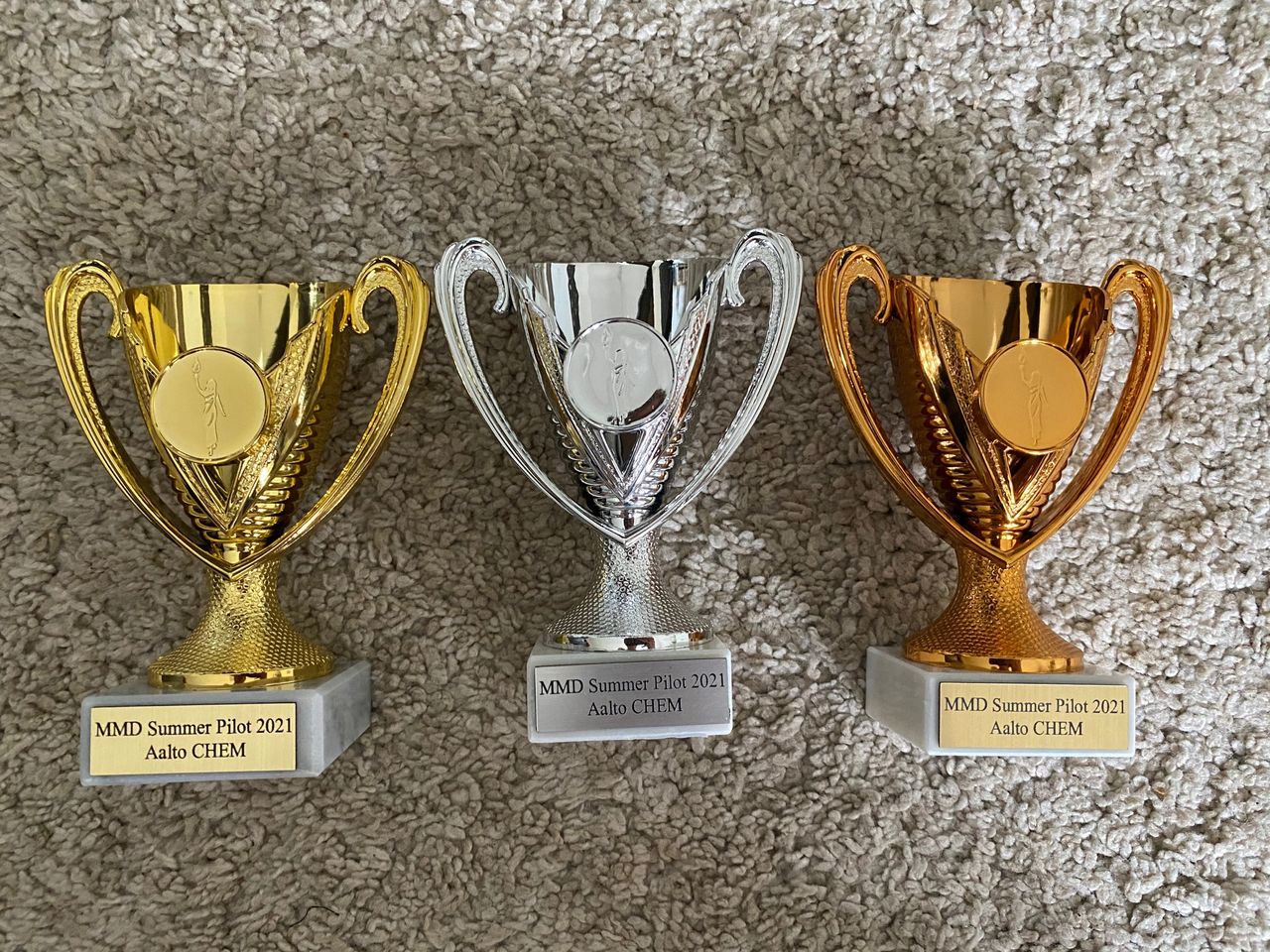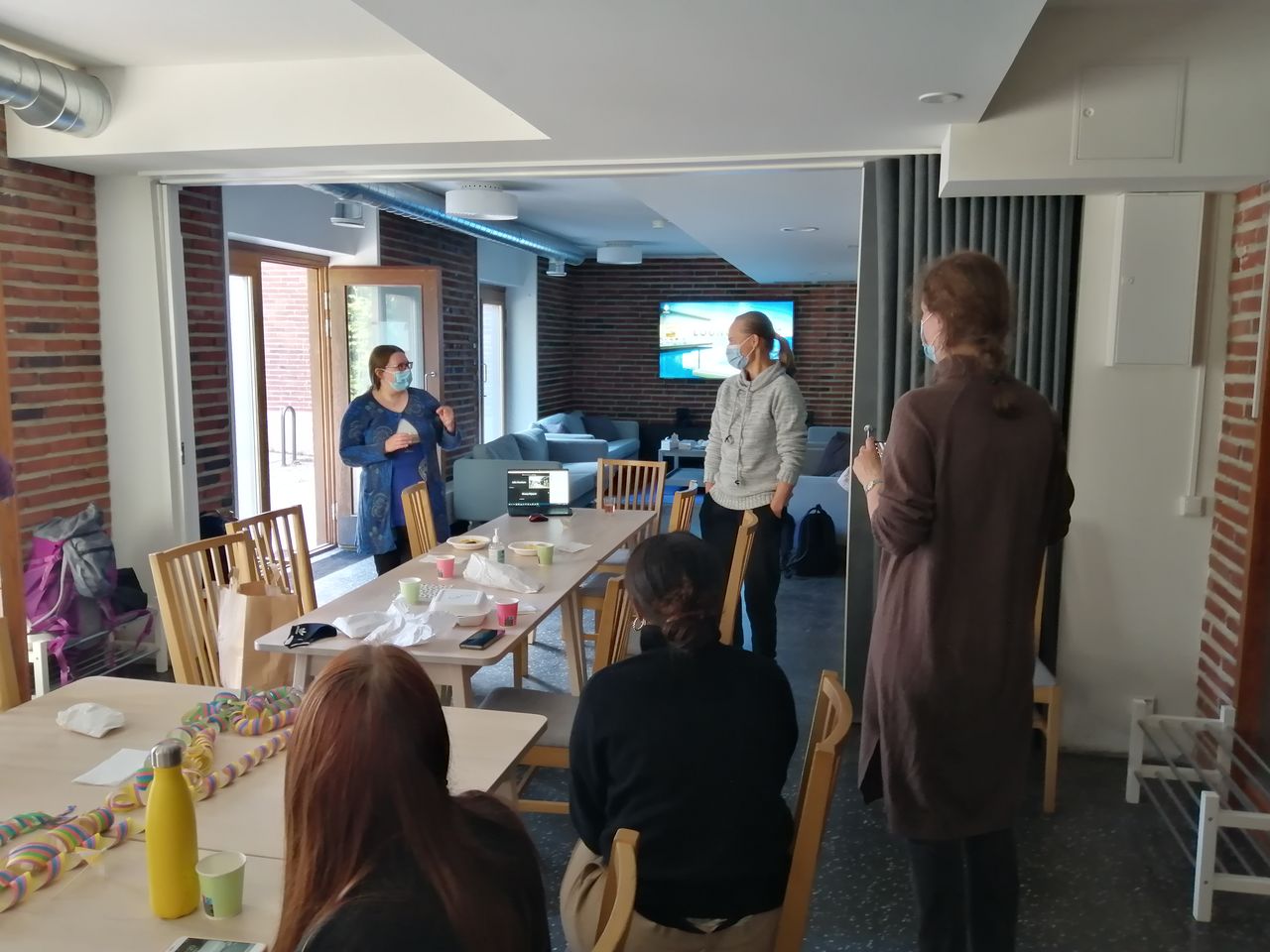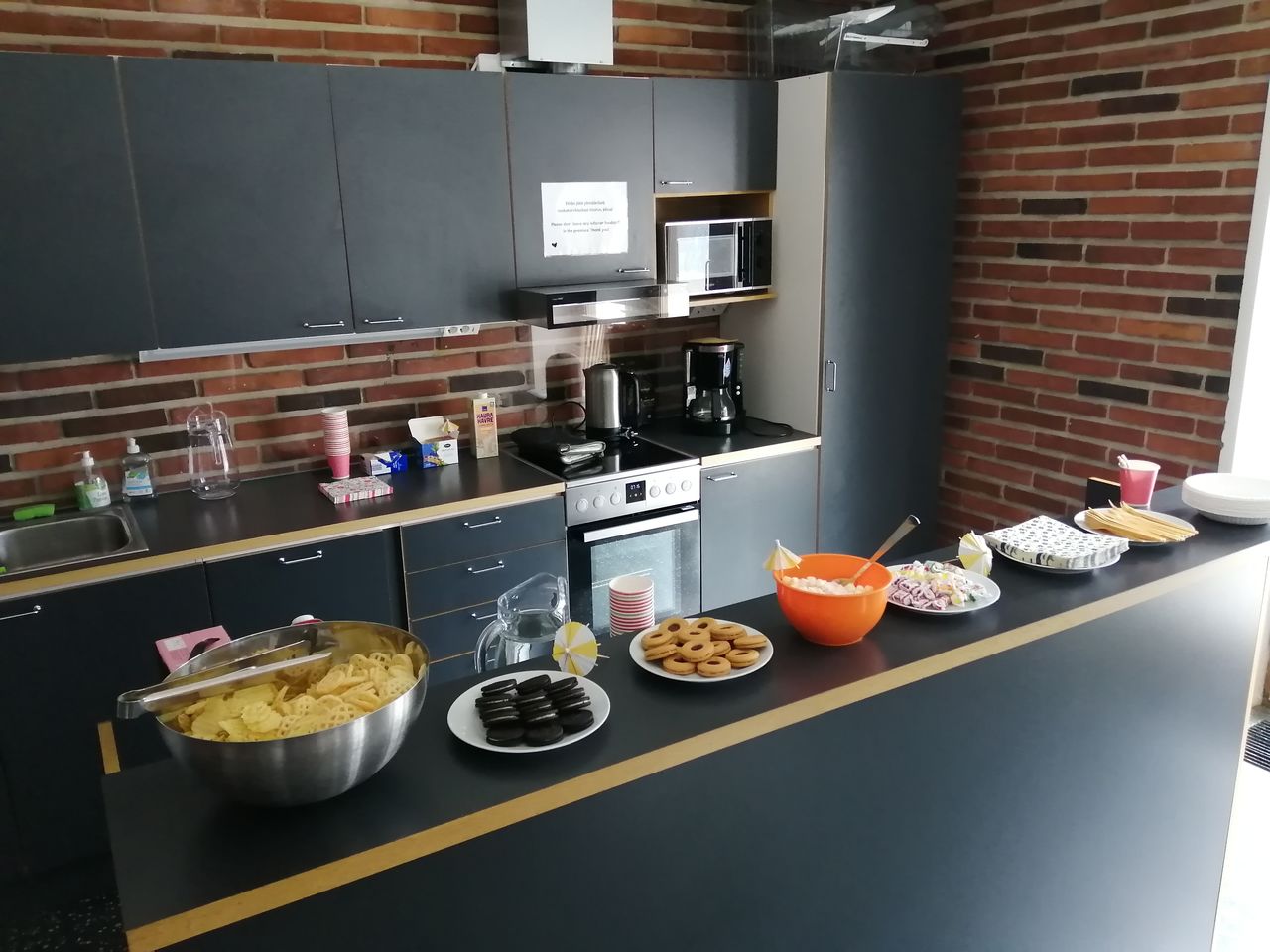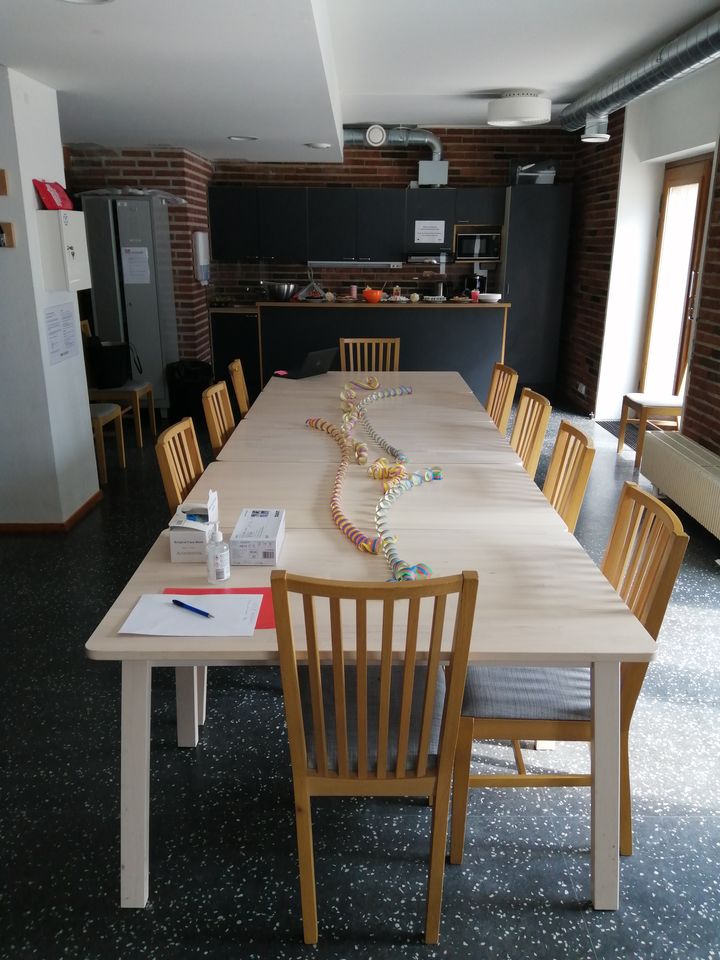MMD Summer Pilot 2021
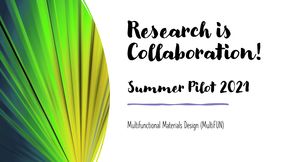
To make the most out of learning in the summertime, a special pilot project was designed by the group leader, Prof. Jaana Vapaavuori, which aimed at encouraging group members to assume new roles, while also facilitating peer support in everyday work.
First of all, in regard to lab safety, semi-permanent lab managers were assigned to monitor safe laboratory practices. To ensure good distribution of knowledge and skills, several types of meetings in smaller groups were initiated in addition to weekly group meetings. Rafael Grande, postdoctoral researcher from the Department of Bioproducts and Biosystems at Aalto University, was invited as a guest presenter to share his expertise on how to create good science presentations.
Moreover, during summer Prof. Jaana Vapaavuori and Dr. Fevzihan Basarir introduced Journal Club meetings for postdocs and doctoral students. More about Journal Club meetings
MMD Summer Pilot goals/outcomes:
*for postdocs – managing the complete research process from the idea to publication: 'How do I prioritize between conducting my own research and guiding others?'
*for doctoral students – learning to be one’s own project manager in the short and long term: 'How do I prioritize between different projects?'
*for summer interns – learning to conduct research in a systematic and responsible manner, being responsible for one project: 'How do I prioritize my daily tasks?'
It is important to emphasize the collaborative nature of the Summer Pilot, as it encouraged group members to ask questions, share ideas and provide other feedback on a continuous basis (e.g. a special poll was sent out to determine preferences regarding the minigroup communication channels).
'Research is Collaboration' workshop series
A series of workshops, hosted by Prof. Jaana Vapaavuori and university lecturer Kirsi Yliniemi, included three episodes and took place during our group's weekly meetings via Zoom.
The first episode started with a general discussion about research collaboration: what is it and how can one improve the chances for successful collaboration, and what are the factors affecting different levels of intellectual and practical integration in research collaborations? After that, we moved to analyzing research collaboration skills in three areas: self-awareness and openness, establishing new collaborations/exchanges, and making the best out of the team.
Then participants were divided into three breakout rooms where we discussed and shared personal experiences about the following situations: courage of revealing your 'ignorance', 'vulnerability' and/or 'lack of skills'; explaining your research to people of differing research backgrounds; delivering when promised or communicating well about changes in schedules. After returning to the main room, we discussed our insights and ideas with the whole group.
During the second episode we focused on such issues as active listening and asking the “right” questions; networking skills – especially making the first contact; flexibility in taking new roles / adapting to what the group needs. The ability to accept your mistakes and misunderstandings, approaching 'science-famous' people with an elevator pitch, and the ability to set up and enforce boundaries were among the topics that the third episode was devoted to.
Collaboration Challenge
The Collaboration Challenge was designed on the basis of the 'Research is Collaboration' workshop series. At the end of each workshop our group members were given a selection of tasks that they could accomplish prior to the next workshop. Such tasks included, for example, having group members ask questions that they might consider 'stupid' in a group meeting, talk to a person outside the group about their own research topic and goals, try on a different role in a work meeting (e.g. leading the discussion instead of observing), prepare a short elevator pitch about themselves as researchers, etc.
The Collaboration Challenge was developed to provide an opportunity to improve one's communication and networking skills, as well as cultivate self-awareness and teamwork. The winners of the Collaboration Challenge were Riia Vidgren (gold), Julia Vuorinen (silver) and Noora Jäntti (bronze).
Participant of the anonymous Summer Pilot feedback survey"I really liked the Collaboration Challenge, it gave me a little push to get out of my comfort zone."
Minigroup meetings
The idea behind minigroup meetings was to discuss short-term research plans and give comments and peer support to acute research problems and challenges. Participants were encouraged to be self-organized and to facilitate collective ideation through considering the most important questions related to everyday experimental work, paper writing, presentations, etc.
All group members were divided into the following three minigroups: 'Biomaterials & Photonics & Energy', 'Sensing & Self-Assembly & Energy', 'Textiles & Actuation & Soft Robotics'. Meetings took place once a week, and each group consisted of 1-2 postdocs and several doctoral students and interns. First minigroup meetings were devoted to presenting tentative research plans for the summer. Senior group members were given an opportunity to act as meeting leaders.
Why minigroups?
-valuable managerial experience for postdocs
-more comprehensive supervision for doctoral students
-team spirit boost and new ideas generation -> for everybody ?
Progress meetings
Monthly progress meetings were designed as longer in-depth conversations with the group leader Prof. Jaana Vapaavuori. Group members were encouraged to consider in advance what questions they would like to discuss (science and research, career development, general issues, etc.) and to submit prepared slides before each meeting. These monthly overview sessions provided support in targeting long-term goals and improving workload balance.
Peer meetings
Peer meetings were introduced to provide peer support at many levels, for instance, in decision making, career goals, preparing better publications, and well-being. Groups were formed based on the same research theme or other shared interests. For summer interns, a special peer group was launched with weekly meetings on Fridays.
The intention behind the peer meetings was for them to be self-organized with the aim to exchange knowledge and expertise, as well as cultivate collaborative team spirit and new innovative ideas.
Summer interns
In summer 2021 seven interns were working in the MMD research group. They were involved in a variety of research projects. In addition to weekly group meetings, from the outset all interns were encouraged to have daily interaction with their advisors which later transformed into regular meetings at least once a week. They were also given an opportunity to find substitutes for the time when their advisors were on holidays.
Participant of the anonymous Summer Pilot feedback survey“Group meetings are always really interesting and one of the highlights of the work week.”
Summer Pilot feedback survey
The pilot project was carried out in June-August 2021. We asked our group members to note down their observations during the summer, and it was emphasized that any feedback was very valuable. An anonymous survey was developed and sent out at the end of August. It was important to take a calm moment and reflect on what practices supported work and what could be improved.
The results of the survey were discussed in early September during one of the weekly group meetings when we evaluated the Summer Pilot together. The survey results provided us with useful feedback on the pilot project, as well as with interesting ideas and suggestions. More than 70% of our group members participated in the survey, and we were able to see a wide range of opinions regarding, for instance, the optimal frequency and structure of different types of meetings, the quality and accessibility of presentations, the Collaboration Challenge outcomes, etc. It became clear that meetings in smaller groups allowed for more specific conversations and more time could be devoted to each aspect.
Based on the survey results, we were able to adjust meeting schedules and structures and create a list of tips for our work in the autumn period (e.g. using Gantt chart, adding research background slides to presentations, inviting more guests to the group meetings). Each minigroup was encouraged to decide on the frequency and organization of their meetings for the coming months on their own.
Participant of the anonymous Summer Pilot feedback survey“The [collaboration] workshops were also really helpful, I feel like my presentation skills have significantly improved during this summer."
Summer Get-together event at Teekkari Village
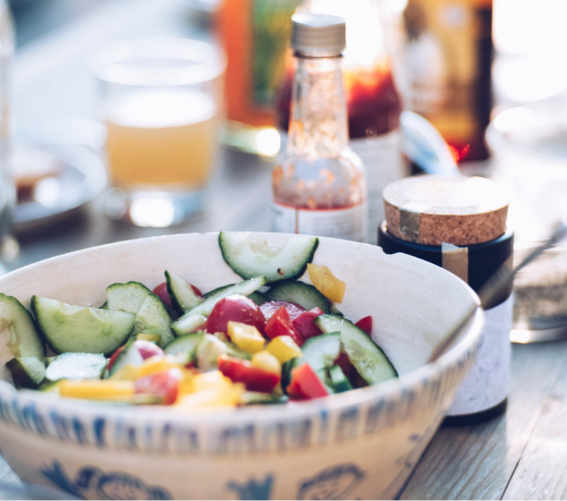
The end of the Collaboration Challenge was celebrated during a group get-together at the end of August. The first online part was devoted to the presentations of our summer interns. The second 'get-together' part took place in the Living Room of Teekkari Village, a very nice and cozy space at the Aalto University campus. Several participants joined us online via Zoom, and that was definitely a good opportunity to practice the hybrid mode of working together.
It was great to see many of our group members in person and to discuss ongoing research, as well as non-work related topics. In addition, winners of the Collaboration Challenge were awarded during the event: Riia Vidgren (gold), Julia Vuorinen (silver), Noora Jäntti (bronze).
A backup plan for a completely virtual event was developed in case coronavirus restrictions would not allow us to meet in person. Moreover, all the participants were sent a reminder about the coronavirus-related recommendations in advance, and a special security and hygiene plan was prepared for the get-together.
Related content:
Multifunctional Materials Design
Professor Jaana Vapaavuori

Summer interns' projects in MMD group
Internships 2021 in Multifunctional Materials Design research group
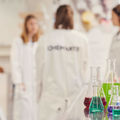
MMD Journal Club
Multifunctional Materials Design research group members present publications from high impact scientific journals
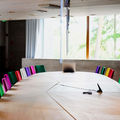
Read more news
Soil Laboratory Exhibition – Exploring the Dialogue Between Human and the Earth in Utsjoki
Soil Laboratory explores the relationship between humans and the earth as a living landscape through ceramic practices in Utsjoki.
The Finnish Cultural Foundation awarded grants for science and art
A total of 15 individuals or groups from Aalto University received grants
Environmental Structure of the Year 2025 Award goes to Kalasatama-Pasila tramway
The award is given in recognition of meritorious design and implementation of the built environment. Experts from Aalto University developed sustainability solutions for the project.







